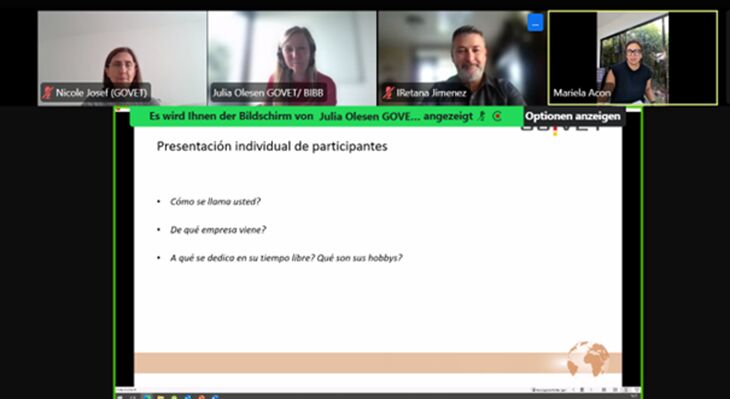Experts' dialogue with Costa Rican trainers
The virtual exchange with Costa Rican apprenticeship trainers was a successful start to a multipart continuing education series. How should I behave as a trainer? What role conflicts might arise? How can these be resolved? These and other questions were the main focus of the webinar.

Experts from the Costa Rican Ministry of Education and private companies joined the GOVET expert team, including Julia Olesen, Peter Rechmann, Nicole Josef and Isabelle Schlender from the division Digital Learning and Education Personnel, to discuss their experiences with dual training in Costa Rica to date.
Topics such as the role, function and conflicts of trainers were discussed, and experiences of participants from Costa Rica and Germany were exchanged. Isabelle Schlender outlined that training specialists are no longer just colleagues. Rather, they also act as educators, supervisors and trainers. Their role has expanded over time and became more complex. This confronts them with different requirements and expectations.
When trainers are aware of their roles, this has two advantages:
- They have a clear idea of the tasks and challenges involved.
- They can consciously set priorities in the event of possible role conflicts.
In reality, situations may occur in which not everyone can meet the requirements ad hoc – this applies not only to the company's requirements, but also to the requirements and expectations of the trainees and their own.
The role of trainers
between role model and daily challenges
Trainers are not only mentors, but also serve as role models for trainees during their training period. Training is not just about learning in the classroom; it also contributes to the personal development of the individual and lays the foundation for a long-term professional career.
Participants responded that they find it challenging to maintain the motivation of trainees. There are also other aspects that are relevant in Germany, including the social behaviour of trainees, cooperation between learning locations (company and vocational school), avoiding misunderstandings, and the structured organisation of the training process.
A frequently mentioned area of tension arises from the different role models that are adopted within the training relationship. For example, conflicts can arise when trainees see their role primarily as ‘workers’ rather than learners. As their specialist knowledge grows, a certain shift in roles can also take place, which can lead to imbalances or misunderstandings if agreements are unclear or communication is lacking.
Role conflicts often arise when different expectations – on the part of the trainees, the trainers or even colleagues – collide. These different perspectives can lead to tensions if they are not openly discussed. To counteract this, transparency, clear communication and continuous reflection on the respective roles and responsibilities are essential. This is the only way to develop a common understanding and create a constructive learning environment.
The kick-off webinar with the participants showed that there is still a great need for professional exchange, which will continue in Costa Rica in mid-October. Julia Olesen and Isabelle Schlender will provide professional support to the team in Costa Rica, advising and assisting them on the quality of training.
Background on vocational training cooperation with Costa Rica
Germany and Costa Rica have been cooperating in vocational training since 2016 on the basis of a joint declaration of intent between the Federal Ministry of Education and Research (BMBF) and the Costa Rican Ministry of Education (MEP). The BMBF accompanies the ‘Commission for the Advisory and Promotion of Dual Vocational Training’ (CAP) in an ‘observing status’. This commission is composed of representatives from government ministries, institutions, the private sector and social partners, and makes political and strategic decisions on issues relating to the design, financing and institutional and legal consolidation of dual vocational training. In addition, the BMBF supports and advises the Costa Rican Ministry of Education on the operational implementation of dual education through GOVET.
Through dialogue, consultation, delegation visits and expert advice, the BMBF has contributed to the enactment of a decree on the introduction of dual training in Costa Rica in 2018.
On 12 August 2019, the parliament passed the Dual Vocational Education and Training Act, which came into force one month later. In order to further support the reforms in the partner country, vocational education and training research and the participation of economic and social partners in vocational education and training in Costa Rica are currently being strengthened by two further BMBF projects (CoRiVET and CoRiCert).